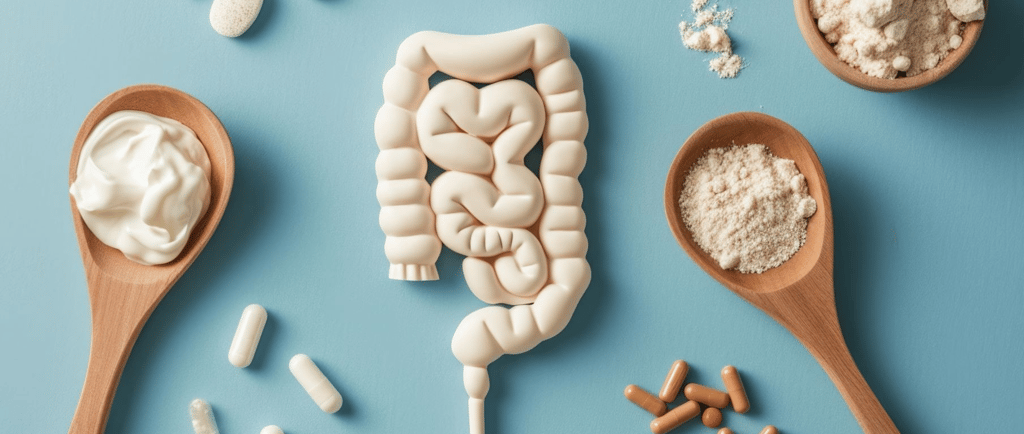What are Probiotics?
What are Probiotics? Understanding the "Good Bacteria" for Gut Health
GENERAL PROBIOTICS
Dr. Kevin Hagen
11/8/20243 min read


Probiotics are live microorganisms, primarily bacteria and yeasts, that are beneficial to our health, especially for the digestive system. Often called "good" or "friendly" bacteria, probiotics play a crucial role in maintaining a balanced gut microbiome and supporting various bodily functions. You can find probiotics in certain foods, supplements, and even beauty products, as their popularity has grown for their purported health benefits.
How Do Probiotics Work?
Our body naturally hosts trillions of microorganisms in the digestive tract. These microorganisms include both helpful and harmful bacteria that coexist to maintain a balanced environment in the gut. However, factors like diet, lifestyle, stress, and antibiotic use can disrupt this balance, leading to an overgrowth of harmful bacteria and causing digestive discomfort, immune issues, or other health concerns.
Probiotics help restore balance by populating the gut with beneficial bacteria, which can outcompete or suppress harmful bacteria. They aid in digesting food, synthesizing vitamins, and strengthening the immune system, contributing to overall wellness.
Types of Probiotics
Different strains of bacteria and yeasts provide different health benefits. Some of the most common probiotic strains include:
Lactobacillus: One of the most common probiotic types, Lactobacillus is found in yogurt and fermented foods. It may help with lactose digestion, irritable bowel syndrome (IBS), and support general digestive health.
Bifidobacterium: Often found in dairy products, Bifidobacterium strains may help ease symptoms of IBS, improve immunity, and promote gut health.
Saccharomyces boulardii: This beneficial yeast is known for its effectiveness in treating diarrhea and is often used to prevent antibiotic-related side effects on the gut.
Each strain has specific effects, which is why it's important to choose a probiotic supplement or food that contains strains targeted to your health needs.
Health Benefits of Probiotics
Probiotics have a wide range of health benefits that extend beyond digestion. Here are some of their key benefits:
Supports Digestive Health: Probiotics help maintain a balanced gut flora, which aids in digestion and nutrient absorption. They may also reduce bloating, gas, and diarrhea, and are often recommended for IBS management.
Boosts Immune System: Probiotics play a role in immune function by supporting the gut barrier and modulating immune cells. A balanced gut can fend off pathogens and decrease the likelihood of infections.
Mental Health and Mood: Some studies have found links between gut health and mental well-being. Known as the “gut-brain axis,” this connection means that a healthy gut can positively impact mood and even reduce symptoms of anxiety and depression.
Skin Health: Probiotics may help reduce inflammation and certain skin issues, such as acne, eczema, and rosacea. Some skincare products now include probiotics to help maintain a healthy skin microbiome.
Weight Management and Metabolism: Some research suggests that probiotics may influence body weight and metabolism by altering the composition of gut bacteria. Certain strains may help with reducing body fat and managing blood sugar levels.
Sources of Probiotics
Probiotics are available in many foods, supplements, and even drinks. Here are some of the most common probiotic sources:
Yogurt: Many types of yogurt contain live cultures, which are beneficial for gut health. Be sure to choose yogurt labeled with "live and active cultures" for probiotic benefits.
Kefir: A fermented milk drink, kefir is rich in probiotics and often contains multiple strains.
Sauerkraut: Fermented cabbage, known as sauerkraut, is a source of probiotics, as well as fiber and vitamins.
Kimchi: A traditional Korean dish made from fermented vegetables, kimchi is a spicy, probiotic-rich food.
Kombucha: This is a fermented tea beverage that contains beneficial bacteria and yeasts.
Miso: A Japanese seasoning made from fermented soybeans, miso is often used in soups and sauces and provides gut-healthy probiotics.
Supplements: Probiotic supplements are widely available and are beneficial if you're looking to target specific health concerns or add more probiotics to your diet conveniently.
Are Probiotics Safe?
For most people, probiotics are safe to consume and have minimal side effects, such as mild digestive discomfort when starting. However, individuals with weakened immune systems or certain health conditions should consult a healthcare provider before taking probiotics, as introducing live bacteria might carry risks in these cases.
How to Choose the Right Probiotic
When choosing a probiotic, consider these factors:
Strain Specificity: Different strains serve different purposes. Look for strains specific to your needs, such as Lactobacillus acidophilus for general gut health or Bifidobacterium longum for IBS.
CFU Count: CFU stands for "colony-forming units," which indicate the number of viable bacteria. A higher CFU count isn’t always better, but for most adults, a supplement in the range of 1-10 billion CFUs is recommended for daily use.
Storage Requirements: Some probiotics need refrigeration to stay effective. Read labels to ensure you store them correctly.
Expiration Date: Check expiration dates to ensure you're taking active cultures, as the effectiveness of probiotics can decrease over time.
Final Thoughts
Probiotics offer a natural and effective way to support digestive health, boost immunity, and promote overall wellness. Whether you get them from food or supplements, incorporating probiotics into your diet can be a simple step toward better health. However, remember that a balanced diet, proper hydration, and lifestyle factors are also key to a healthy gut. If you’re interested in adding probiotics to your routine, speak to a healthcare professional, especially if you have specific health goals or concerns.
